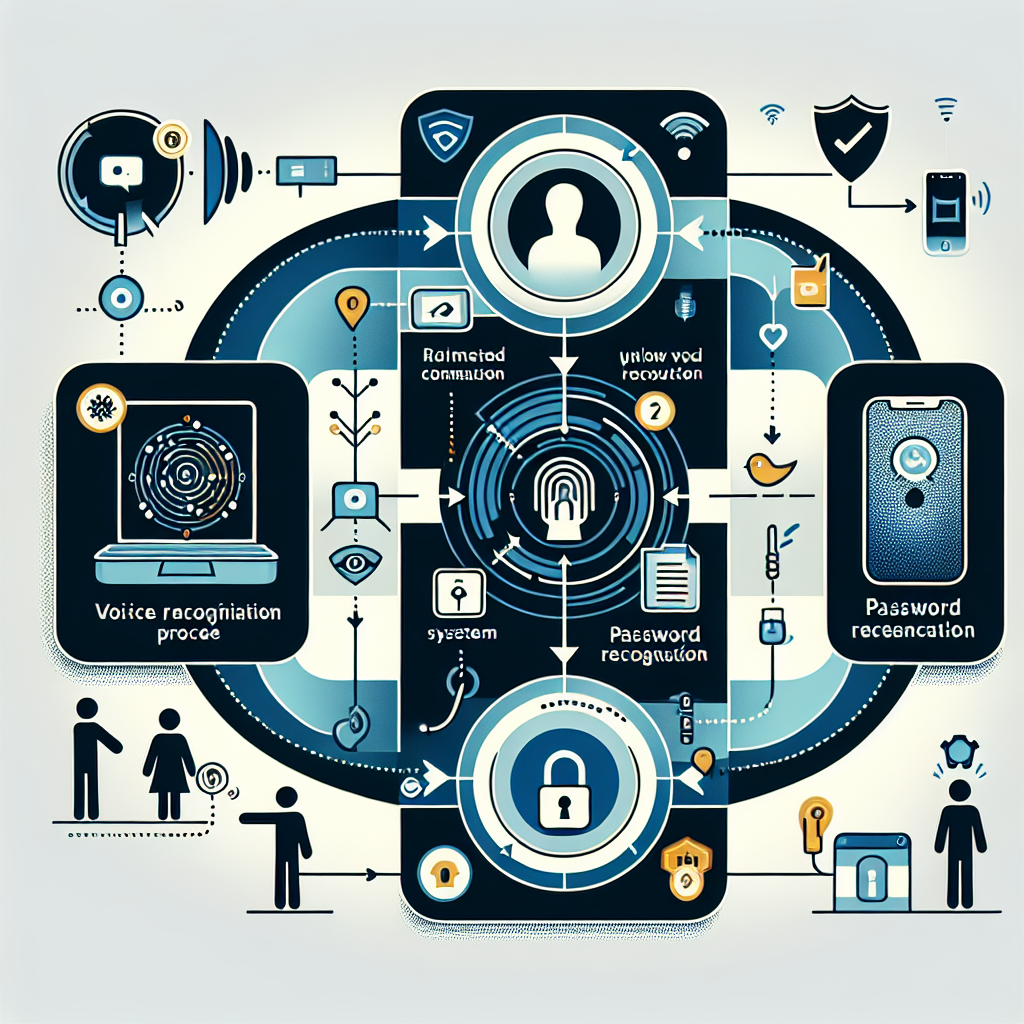
As technology advances, securing individuals' private data has become a critical issue, making user authentication a top priority. One of the modern methods being used to verify a user's identity is voice authentication, a biometric method that recognizes unique vocal features. This method is increasingly being employed in industries such as banking and telecommunications to enhance the security of phone support, particularly for password resets.
Voice authentication, also known as voice biometrics, works by distinguishing the unique characteristics of a person's speech. These unique features are then compared with previously recorded samples to authenticate the identity. It's like a fingerprint for your voice, which is virtually impossible to replicate.

Following an image, in customer support scenarios, voice-activated password reset provides an additional layer of security compared to traditional methods. For instance, it can eliminate the risks associated with phishing attacks, where attackers attempt to trick individuals into revealing their password over the phone or through email. The chances of imposters successfully mimicking your unique voice characteristics are significantly slim, making this biometric authentication a robust security tool.
Adopting voice authentication for password resets can also enhance the customer experience by making the password reset process less arduous and time-consuming. Instead of answering numerous security questions or waiting for email verification, customers only need to speak a few phrases to verify their identities and reset their passwords with ease.
As more enterprises realize the security and efficiency benefits of voice authentication, its popularity is poised to increase. In a world where convenience and security are paramount, voice biometrics for password resets presents an ideal harmony of both. For sensitive information protection, voice-activated password reset brings us a step closer to a safer future.
In today’s world of increasing technological advancements, the need for reliablility and robustness in security measures has become critically essential. One technology that has come under the spotlight for its potency and simplicity in user verification is voice-activated password reset in phone support systems. This emerging authentication method brings with it a myriad of benefits that provide enhanced user experience and stronger account security.
Primarily, voice recognition technology equips systems with a highly secure medium for password resets. By leveraging unique speech patterns and voice inflections, it can accurately verify users. This technology is less prone to hacking, reducing possibilities of unauthorized data breaches, as compared to traditional password methods that typically rely on easily forgettable or predicable questions and answers.
Secondly, the utilization of voice-activated password reset eradicates the need for traditional security questions. Traditional questions often ask information that is either too common (easy for others to guess) or too obscure (easy for the user to forget). With voice recognition, users no longer need to recall complex answers, making the password reset process more efficient and less frustrating.
Finally, one of the defining benefits of this technology is its ability to expedite the user verification process. Compared to the tedious and time-consuming process of manual typing and entering personal information, a voice-activated system can verify users quickly and effortlessly. This not only offers users a convenient and hassle-free experience, but also enhances operational efficiency for support teams.
In conclusion, the implementation of voice-activated password resets in phone support systems is a progressive step towards enhancing security and improving user experiences. As technological advancements continue to evolve, industries should consider adopting this innovative solution to stay ahead in the realm of cybersecurity.
If you're looking to enhance your company's customer support strategy with the latest technological advancements, implementing voice-activated systems to facilitate password resets could be of considerable value. Voice recognition is an emergent technology that combines artificial intelligence and deep-learning algorithms to identify and understand human speech.

When used in customer support, these systems can distinguish individual voices, thus boosting security by using a passcode that can't be easily duplicated or stolen - the customer's unique voiceprint. This ensures that password reset procedures are securely facilitated, thwarting potential breaches.
To embed such technology into your existing infrastructure, you'll need some specific technological solutions. Firstly, a robust voice recognition system, tailored to your specific needs, should be considered. Several vendors, like Nuance and Amazon Polly, offer comprehensive and customizable solutions.
Despite the high level of automation achieved with these systems, human oversight will still be needed. Your staff will need training to handle queries the system may not be able to take care of itself and must be prepared to keep up with the continuous learning process as the AI adapts.
There's no denying the transformative potential of voice-activated password reset systems. By blending advanced technology with your existing support structures, you can significantly enhance security while providing fast, efficient service. Your customers will appreciate the smooth experience, and your company will benefit from increased trust and loyalty.
In the evolving landscape of telecommunication, voice-activated password reset presents a compelling approach to enhancing security during phone support. However, the implementation of such technology is not without obstacles. Encompassing barriers such as accents, voice changes, and technical disruptions, these challenges require sophisticated solutions to ensure a robust and reliable system.
One common hurdle is the diversity of user accents. With people contacting support from every corner of the globe, voice recognition technology must understand and process accents accurately. However, major strides have been made by technology leaders such as Google and Apple to integrate advanced machine learning algorithms that can understand a myriad of dialects and accents.
In an equally challenging scenario, voice changes due to factors such as age, health, and environmental conditions can cause the system to fail in recognizing the user's identity. Yet, modern biometric voice authentication technologies employ powerful voice profiling techniques making the system adaptive to such changes and delivering greater security.
Last, but not the least, is the possibility of technical failures. Interruptions in network connection, low voice quality, and background noise can potentially hinder the process of password reset. Fortunately, the implementation of advanced transcription tools and a robust error handling system can anticipate and manage these factors effectively.
In conclusion, while the challenges for voice-activated password reset in phone support are substantial, the evolving technologies are making it possible for us to meet these obstacles head-on. Adapting to these changes will not only lead to a more secure system but will also vastly improve the user's experience during phone support.
The advent of voice-activated password resets has paved the way for numerous businesses to enhance the security of their phone support. Let's examine some real-life case studies that highlight the effectiveness of this innovative technology in enhancing security.

The telecom industry, particularly Verizon, has been an early adopter of this technology. The use of voice biometrics for password resets has made their customer support process not only more secure against potential fraud but also significantly more convenient for end-users. The customers' voices are, uniquely identifiable, allowing for a secure verification process that is hard for cybercriminals to spoof. By using this technology, Verizon could deliver a safer customer service experience.
Another industry that has effectively employed voice-activated password resets is the banking sector. HSBC, a globally recognized banking institution, incorporated voice recognition technology to reset passwords in their phone banking systems. End-users were able to easily reset their passwords using their own voice, enhancing both security and user experience. This initiative was met with positive feedback, as it made customer verification more secure and quick without compromising on the vital aspects of user privacy and data security.
What is notable in these case studies is the dual benefit of adopting voice-activated password resets. These businesses didn't just boost their security protocols, but also improved their user experience significantly. The ability to verify oneself by simply speaking is not only more secure but also far more convenient for users. It eliminates the need to remember complicated passwords and the frustration that comes along with forgetting them. Such examples underline the potential of voice activation technology in creating a secure and user-friendly environment.
With the escalating threat of cybercrime, the need for securing customer interactions has never been more pressing. The use of voice biometrics in password reset mechanisms, as illustrated by Verizon and HSBC, offers great promise in enhancing the safety and convenience of phone support services.
As the technological landscape continues to evolve, the future trends in voice authentication look promising. The usage of voice-activated password reset is anticipated to skyrocket due to its distinct advantages: enhanced security, ease of use, and improved customer experience. Deployed widely in phone support, the technology is gaining popularity in various industries including finance, healthcare, and e-commerce.
One of the biggest predictions in the evolution of voice authentication revolves around its meticulous integration with artificial intelligence. IBM believes that the fusion of AI with voice recognition can result in hyper-personalized support. This system doesn't merely reset the password by identifying a user's unique voiceprint, but it comprehends the users' emotions and tone, paving the way for innovative customer support strategies.
Biometric voice recognition is another technology that is set to transform the way we think about security. It also goes a step further by verifying the speaker's physical or behavioural characteristics. Companies like Nuance Communications are leading the way with their cutting-edge biometric solutions.
The increasing deployment of voice assistants such as Alexa, Google Assistant, and Siri, is another testament to the growing trust and reliance on voice recognition technologies. Gartner predicts that by 2023, 25% of employee interactions with applications will be via voice.
However, with the widespread adoption of this technology, we must be prepared for potential security challenges. Synthetic voice attacks, one of the biggest potential threats, involve the usage of artificially generated voices that are indistinguishable from the real ones. To counter these sophisticated forms of attack, advancing and updating security measures are crucial.
In conclusion, the future of voice authentication offers exciting opportunities for more secure, personal, and interactive user experiences. However, ensuring necessary security safeguards is of utmost importance in the face of evolving threats.
Start your free trial for My AI Front Desk today, it takes minutes to setup!








